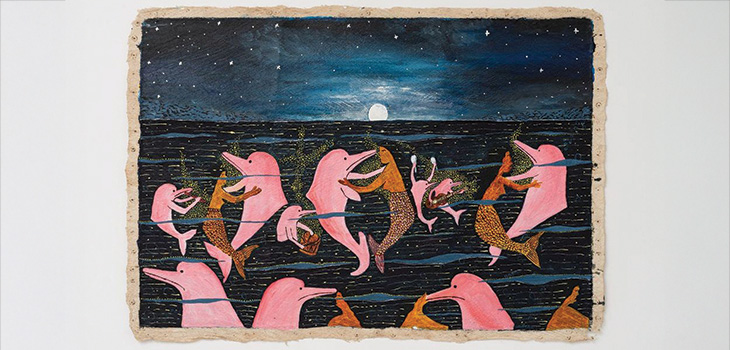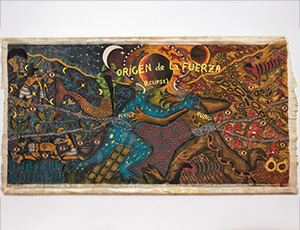*/

In the heart of the Peruvian Amazon, where the renaco tree yields its precious bark and the forest whispers ancient stories, Santiago Yahuarcani has created a visual language that bridges millennia. This exhibition, presented in Manchester’s lovely Whitworth Art Gallery, spans works from 2005 to 2025 and presents the first survey of an artist whose work is as much about cultural survival as it is about visual richness.
Yahuarcani belongs to the Aimeni clan of the Uitoto Nation. He works on traditional bark cloth made from Amazonian trees, and uses pigments sourced directly from the forest floor. His paintings pulse with the rhythm of oral traditions passed down through generations, transformed by him into visual narratives. And many of the pictures are also completely bonkers. They teem with human figures and wildlife, sometimes terrifying and with the distinction between them often unclear. Spirits and rainbows and stars fly through the sky and the forest appears as a very sentient being.
The exhibition demonstrates how Indigenous knowledge systems offer alternative ways of understanding the natural world. But some of the paintings also address periods in the life of the Amazon where nature and indigenous populations have been decimated by extraction exploitation for products such as rubber. Yahuarcani’s painful memories of colonial violence, dispossession and environmental destruction are rendered with the same passion as his celebration of family life and forest sounds.
Organised into themes, the exhibition allows us to trace the evolution of Yahuarcani’s work while understanding the consistent threads that run through it. From his early tourist paintings to his mature explorations of Uitoto mythology, to his paintings which show the impact of COVID-19 on his community, we witness an artist discovering that his great power lies in mining his own cultural inheritance and finding that the themes unearthed have global resonance.
There is some success in transposing the multisensory nature of Yahuarcani’s work with supporting videos and detailed explanations and quotes. The exhibition demonstrates the contemporary relevance of traditional voices and materials used to carry modern messages about environmental protection and cultural rights. Yahuarcani’s work offers a powerful reminder that the beginning of knowledge (to take the exhibition’s title) often lies in remembering what we have always known. The result is art that is both deeply rooted and but wholly relevant to issues of the current and desperate need for social and environmental justice.
Until 4 January 2026 at The Whitworth, Manchester


In the heart of the Peruvian Amazon, where the renaco tree yields its precious bark and the forest whispers ancient stories, Santiago Yahuarcani has created a visual language that bridges millennia. This exhibition, presented in Manchester’s lovely Whitworth Art Gallery, spans works from 2005 to 2025 and presents the first survey of an artist whose work is as much about cultural survival as it is about visual richness.
Yahuarcani belongs to the Aimeni clan of the Uitoto Nation. He works on traditional bark cloth made from Amazonian trees, and uses pigments sourced directly from the forest floor. His paintings pulse with the rhythm of oral traditions passed down through generations, transformed by him into visual narratives. And many of the pictures are also completely bonkers. They teem with human figures and wildlife, sometimes terrifying and with the distinction between them often unclear. Spirits and rainbows and stars fly through the sky and the forest appears as a very sentient being.
The exhibition demonstrates how Indigenous knowledge systems offer alternative ways of understanding the natural world. But some of the paintings also address periods in the life of the Amazon where nature and indigenous populations have been decimated by extraction exploitation for products such as rubber. Yahuarcani’s painful memories of colonial violence, dispossession and environmental destruction are rendered with the same passion as his celebration of family life and forest sounds.
Organised into themes, the exhibition allows us to trace the evolution of Yahuarcani’s work while understanding the consistent threads that run through it. From his early tourist paintings to his mature explorations of Uitoto mythology, to his paintings which show the impact of COVID-19 on his community, we witness an artist discovering that his great power lies in mining his own cultural inheritance and finding that the themes unearthed have global resonance.
There is some success in transposing the multisensory nature of Yahuarcani’s work with supporting videos and detailed explanations and quotes. The exhibition demonstrates the contemporary relevance of traditional voices and materials used to carry modern messages about environmental protection and cultural rights. Yahuarcani’s work offers a powerful reminder that the beginning of knowledge (to take the exhibition’s title) often lies in remembering what we have always known. The result is art that is both deeply rooted and but wholly relevant to issues of the current and desperate need for social and environmental justice.
Until 4 January 2026 at The Whitworth, Manchester



The Bar Council is ready to support a turn to the efficiencies that will make a difference
By Louise Crush of Westgate Wealth Management
Marie Law, Director of Toxicology at AlphaBiolabs, examines the latest ONS data on drug misuse and its implications for toxicology testing in family law cases
An interview with Rob Wagg, CEO of New Park Court Chambers
What meaningful steps can you take in 2026 to advance your legal career? asks Thomas Cowan of St Pauls Chambers
Marie Law, Director of Toxicology at AlphaBiolabs, explains why drugs may appear in test results, despite the donor denying use of them
The appointments of 96 new King’s Counsel (also known as silk) are announced today
Ready for the new way to do tax returns? David Southern KC continues his series explaining the impact on barristers. In part 2, a worked example shows the specific practicalities of adapting to the new system
Resolution of the criminal justice crisis does not lie in reheating old ideas that have been roundly rejected before, say Ed Vickers KC, Faras Baloch and Katie Bacon
With pupillage application season under way, Laura Wright reflects on her route to ‘tech barrister’ and offers advice for those aiming at a career at the Bar
Jury-less trial proposals threaten fairness, legitimacy and democracy without ending the backlog, writes Professor Cheryl Thomas KC (Hon), the UK’s leading expert on juries, judges and courts